Transferable stake and neighbourhood hopping
The Swarm Community Call in September was filled with updates and new ideas, most of which were driven by community input, covering topics from advancements developments in node management to innovative projects that use Swarm technology for decentralised research and artificial intelligence.
As usual, Niki Papadatou opened the Call and provided an update on the latest Bee 2.2.0 release, with the main highlights being neighbourhood hopping and transferable stakes. Node operators can now move nodes across neighbourhoods while keeping their stakes. They also have the option to withdraw appreciated stakes. This provides more flexibility in node management and increases the potential for profitability. She urged operators to follow instructions closely when upgrading and moving nodes to ensure a smooth update of the neighbourhood population.
Looking ahead, Bee 2.3 promises new features such as a reserve size doubling mechanism to increase profitability by expanding storage capacity. In addition, a new price hierarchy feature will dynamically adjust node prices to follow supply and demand, creating a fairer market for all operators.
In Focus
Become a Bee operator with Beest
In this month’s In Focus, Ramesh Pallikara introduced Beest, an interactive CLI toolkit that simplifies the management of multiple Bee nodes. It automates node configurations, runs ether-proxy by default and provides the convenience of using a single funding wallet for deploying nodes. In a live demo, Ramesh showed how Beest can manage multiple nodes on both mainnet and testnet, with features such as automatic Bee installation and node version management.
Future updates to Beest will include non-interactive modes for CI/CD workflows, node staking and a refined process for selecting weak neighbourhoods to maximise staking opportunities.
Community Talks
Fair Data Protocol and FDP integration
In the first part of the Community Talk, Áron Soós showcased how the Fair Data Protocol (FDP) and Swarm can be used to connect multiple dApps while ensuring seamless data access. Using the Swarm Dashboard, Etherjot and Fairdrive, Áron showed how FDP allows for data created in one dApp to be reused and accessed by other dApps. A concrete example focused on creating a blog with Etherjot and then connecting and accessing the .md file via Fairdrive without duplicating or siloing the data.
Such a decentralised approach ensures more efficient data management while maintaining data control across the entire Swarm ecosystem.
Swarm and DeSci
The second part of the Community Talk was reserved for Aata from DeBoot. He presented their project for Litegrav, an Estonian startup focussing on microgravity research and creating low-cost laboratory equipment that can simulate microgravity for experiments on Earth.
During the presentation, Aata explained how they modified Litegrav’s stock machine, which uses a Raspberry Pi for data collection and storage. The machine was configured to perform a decentralised boot process at startup. In this setup, data collected during the experiments is securely stored on Swarm and is always available, making Swarm an integral part of their prototype for Litegrav’s research infrastructure.
In the future, the DeBoot team plans to make the system even more flexible so that any boot image can be used without the need for hand-crafted file systems. They want to achieve this by further decentralising and improving the boot process. This innovation has the potential to expand the scope of decentralised research and allow researchers to conduct experiments more efficiently while ensuring data integrity and accessibility.
Announcements
Swarm Fellowship for decentralised data provenance tracing
As part of the Announcement segment, Črt Ahlin gave a quick rundown of the recent Swarm Fellowship grant for Datafund. The Fellowship will support the development of a decentralised data provenance toolkit. The toolkit will focus on tracking and verifying the provenance of data and AI models, ensuring that all changes and modifications are always available in a transparent and immutable fashion on Swarm.
The toolkit aims to address growing concerns around data and model ownership, particularly in cases where models have been trained on data without the proper permissions. Additionally, the project aligns with emerging regulations that require AI models to be more transparent and traceable. By building an open-source toolkit, Datafund plans to make it easier for AI applications to integrate data provenance solutions, ensuring compliance with legal requirements and fostering greater trust in AI systems.
EthSofia sponsorship
Tamás Hatházi wrapped up the call by sharing details about Swarm’s sponsorship of EthSofia, happening between 17 and 19 October in the Bulgarian capital, Sofia. Tamás invited everyone to join Áron’s 30-minute presentation on the 17th, and a side event later in the evening for a drink and a hack challenge with the Swarm team, at a bar called K.E.B.A. (or K.E.V.A. spelled in Latin letters). Meet you there if you’re in Sofia!
The next Swarm Community Call will be held on 31 October - add to calendar. You are welcome to attend in Halloween costumes and post any silly or serious questions to the Team using this online form in the meantime; the questions received are answered live at the Calls.
Discussions about Swarm can be found on Reddit.
All tech support and other channels have moved to Discord!
Please feel free to reach out via info@ethswarm.org
Join the newsletter! .




